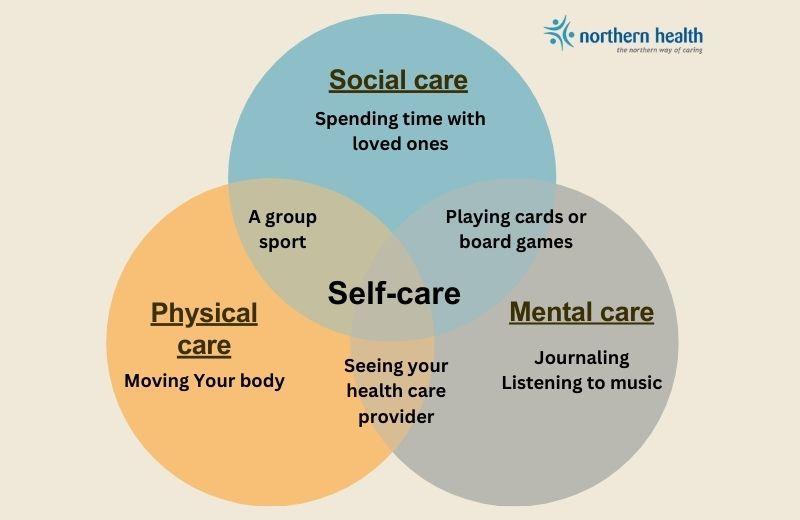When you hear the term self-care, what comes to mind? Is it getting a manicure or a facial? Self-care is often promoted in these limited ways, but it’s so much more!
What is self-care?
July 24 is International Self-Care Day, a day to consider what you need to support your health and well-being more broadly. This can include mental, social, intellectual, spiritual, and practical health and well-being, and how you define health and well-being impacts what self-care practices make sense for you. You might be someone who enjoys spending time in nature, sharing a tea and a chat with a friend, organizing your closet, or saying no to a request – there isn’t one right way to do self care. Finding ways to take care of yourself is key to creating meaningful self-care.
Why is self-care important?
Self-care plays an important role in maintaining health and wellness. Specifically, it can improve your ability to cope with stress and emotions, to be kind to yourself, and to help strengthen your relationships.
For me, balancing household chores, parenting and work can be stressful. Sometimes I get frustrated, especially with my family members, but when I feel myself losing patience, I give myself permission to take a break. Going outside, even for 5 minutes, calms me down and supports better family dynamics.
Why is self-care a challenge?
There are many reasons why it can be difficult to prioritize self-care and many of these are based on the narrow idea that self-care is pampering activities like a facial. Taking time most days to support your health and well-being is not selfish – it’s essential. It may be a challenge to believe you’re worth it, but you are!
What is possible may depend on the resources available to you. For example:
- If you don’t have childcare, it might be hard to get out for a walk with a friend.
- If you have mobility issues, it may be difficult to be active outside if your community doesn’t have clear and maintained sidewalks.
- If you are working two jobs to make end’s meet, it may be difficult to even find a few minutes for yourself.
While it may take effort to resolve these challenges, don’t put your self-care on hold. Ask yourself, "How can I take care of myself in this moment?" Any action, no matter how small, is beneficial.
Getting started
Here are some possible self-care ideas to consider:
- Mental/emotional self-care activities include:
- Taking a break from social media
- Practicing mindfulness
- Deep breathing
- Journaling
- Reaching out to a loved one or health care professional to talk about concerns
- Physical self-care activities may include:
- Moving your body
- Feeding yourself faithfully with regular meals and snacks
- Resting throughout the day
- Aiming for a restful night's sleep
- Spiritual self-care might look like:
- Spending time in nature
- Praying
- Attending faith gatherings
- Listening to music
- Social self-care activities might be:
- Spending time with loved ones
- Phoning a friend or family member
- Cuddling with a pet
- Intellectual self-care may include:
- Doing a crossword puzzle or sudoku
- Reading a book
- Learning a new skill
- Listening to a podcast
- Practical self-care might be:
- Organizing or tidying your space
- Washing your hair and body
- Taking actions to cope with common stressors like financial matters














Comments